Green feces in birds can indicate a variety of health issues, including bacterial infections and liver disease. It is important to observe other signs of illness in conjunction with changes in feces color in order to determine the underlying cause and provide proper treatment.
Green feces in birds can be caused by several different factors, including Chlamydiosis (parrot fever), liver disease, diet-related issues, and other potential causes. Chlamydiosis, also known as parrot fever, is a common cause of liver disease in birds and can produce lime-green droppings.
Birds with liver disease may also have green feces. Green feces can also be caused by diet-related issues such as the consumption of too many fruits or vegetables. In addition to changes in feces color, birds with green feces may also display other signs of illness such as changes in urination or behavior.
For example, birds with Chlamydiosis may also have changes in their urine, which is normally clear. It is important to observe these other signs of illness in order to determine the underlying cause and provide proper treatment. Additionally, it’s important to consult with an avian veterinarian if there are other signs of illness or if there is a change in the bird’s normal behavior.
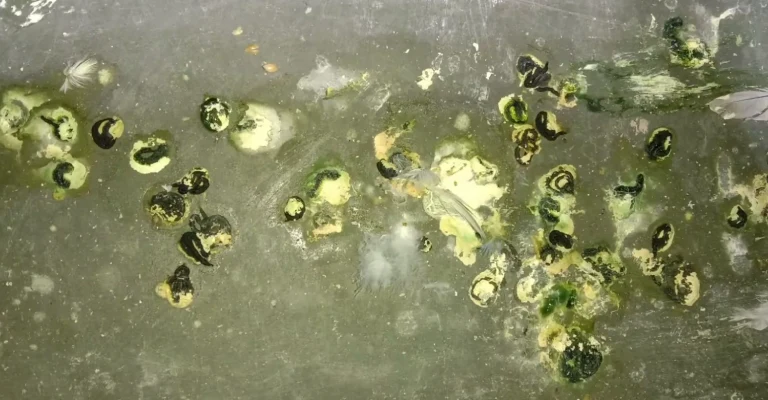
Causes of Green Feces in Birds
Chlamydiosis
Chlamydiosis, also known as parrot fever, is a common bacterial infection that can affect birds. It is caused by the bacterium Chlamydia psittaci and can lead to liver disease in birds. Birds with Chlamydiosis may have lime-green droppings and changes in their urine color.
Liver Disease
Birds with liver disease may also have green feces. The liver plays an important role in the digestion of food and the excretion of waste products, so any issues with the liver can affect the color of a bird’s feces.
Diet-related Issues
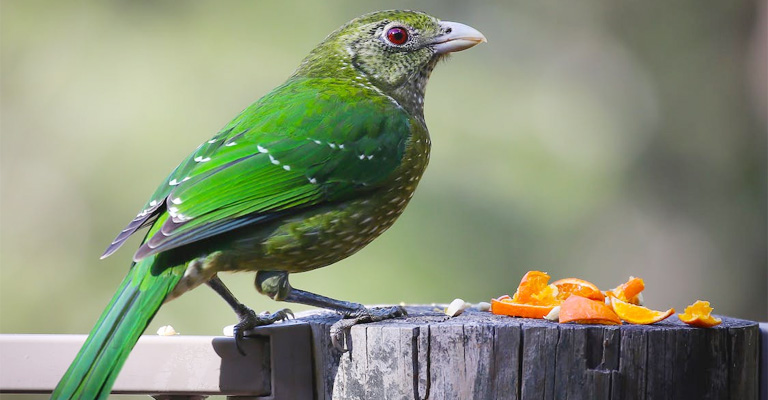
A diet that is high in fruits or vegetables can also lead to green feces in birds. Green vegetables such as spinach or broccoli can give a bird’s feces a green color. Additionally, if a bird is consuming a lot of fruits that contain chlorophyll, this can also cause its feces to appear green.
Other Potential Causes
Other potential causes of green feces in birds include stress, parasites, and certain medications. It’s important to consider all possible causes and consult with an avian veterinarian for proper diagnosis and treatment.
It’s important to note that green feces in birds is not always a sign of illness, and in some cases, it can be normal for a bird’s feces to be green. However, if there are other signs of illness or if the feces color is significantly different from the bird’s normal feces, it’s important to consult with an avian veterinarian for proper diagnosis and treatment.
Symptoms of Green Feces in Birds
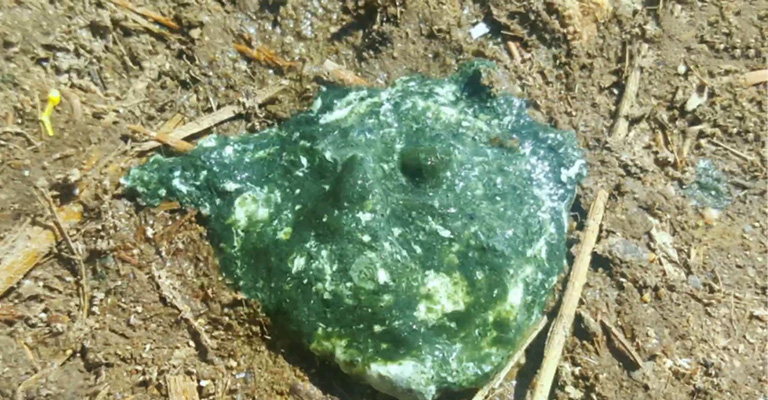
Changes in Feces Color
The most obvious symptom of green feces in birds is a change in the color of the feces. This change can range from a slight green tint to a bright lime-green color. Birds with Chlamydiosis may have lime-green droppings and changes in their urine color.
Changes in Urination
Birds with Chlamydiosis may also have changes in their urine color. Urine is normally clear, so any changes in color should be noted. This can include a green tint or discoloration.
Changes in Behavior
Birds with green feces may also display changes in behavior such as lethargy, loss of appetite, or difficulty breathing. These changes in behavior may be caused by the underlying illness or by the discomfort caused by the illness.
Other Signs of Illness
Other signs of illness that may be seen in birds with green feces include weight loss, feather loss, and respiratory issues. These symptoms can vary depending on the underlying cause of the green feces and may require further diagnostic testing to confirm the diagnosis.
It’s important to note that any changes in feces color, urination, behavior, and other signs of illness should be reported to an avian veterinarian for a proper diagnosis and treatment.
Treatment of Green Feces in Birds
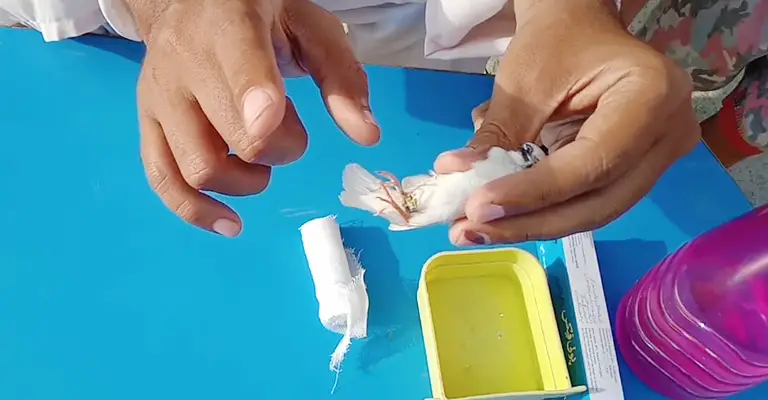
Consultation With an Avian Veterinarian
The first step in treating green feces in birds is to consult with an avian veterinarian. The veterinarian will perform a physical examination, take a detailed history, and may recommend diagnostic tests such as blood work, fecal analysis, and radiographs to determine the underlying cause of the green feces.
Medication for Bacterial Infections or Liver Disease
If the underlying cause of the green feces is a bacterial infection such as Chlamydiosis or liver disease, the veterinarian may prescribe medication to treat the condition. Antibiotics may be prescribed to treat bacterial infections, and medication to support the liver may be prescribed for liver disease.
Diet Adjustments
Diet adjustments may also be recommended to support the bird’s recovery and to prevent future occurrences of green feces. The veterinarian may recommend a specific diet that is low in fruits and vegetables or may advise on the types of fruits and vegetables that are safe for the bird to eat.
Monitoring of Symptoms
After treatment, the bird’s symptoms should be closely monitored to ensure that the treatment is effective. The veterinarian may recommend follow-up visits and may recommend additional diagnostic tests to monitor the bird’s condition. If there is no improvement, the veterinarian may adjust the treatment plan accordingly.
It’s important to note that treatment will vary depending on the underlying cause of the green feces, and it’s essential to follow the veterinarian’s instructions and recommendations. In some cases, green feces may be a sign of a chronic condition that may require lifelong management.
Prevention of Green Feces in Birds
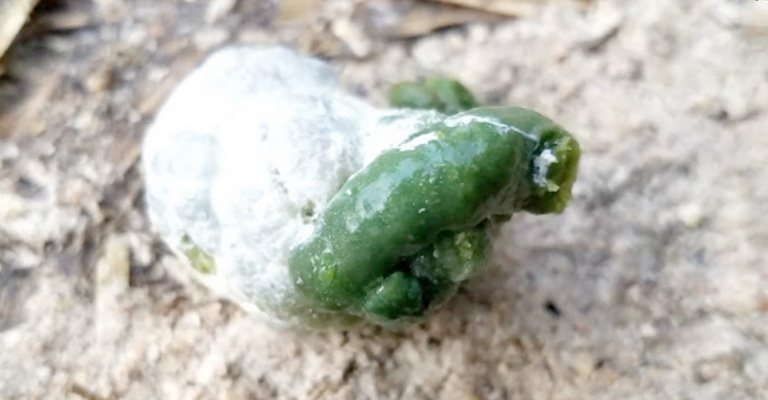
Proper Hygiene
Proper hygiene is important in preventing the spread of infectious diseases such as Chlamydiosis. This includes regular cleaning of the bird’s cage and accessories, as well as proper hand hygiene when handling the bird. It’s also important to keep the bird’s environment clean and to avoid overcrowding, which can increase the risk of disease transmission.
Proper Diet
A proper diet can also help prevent green feces in birds. This includes providing a balanced diet that includes a variety of fruits, vegetables, and protein sources. It’s also important to avoid overfeeding fruits and vegetables as this can cause green feces. Consult with an avian veterinarian for proper diet recommendations for your specific bird species.
Regular Check-ups With an Avian Veterinarian
Regular check-ups with an avian veterinarian can help identify any potential health issues early on, including those that may cause green feces. These check-ups can also help to ensure that the bird is receiving proper care and that any underlying health issues are being properly managed.
Monitoring of Symptoms
Monitoring the bird’s symptoms on a regular basis can also help prevent green feces. This includes monitoring the bird’s feces color, urination, behavior, and overall health. Any changes should be reported to an avian veterinarian for proper diagnosis and treatment.
It’s important to note that preventing green feces in birds may require a combination of proper hygiene, diet, and regular veterinary care. By following these guidelines and monitoring the bird’s symptoms, you can help keep your bird healthy and prevent green feces from occurring.
FAQs
Yes, green feces in birds can be caused by other factors such as diet-related issues and stress. It’s important to consider all possible causes and consult with an avian veterinarian for proper diagnosis and treatment.
In some cases, it can be normal for a bird’s feces to be green. However, if there are other signs of illness or if the feces color is significantly different from the bird’s normal feces, it’s important to consult with an avian veterinarian for proper diagnosis and treatment.
It depends on the underlying cause of the green feces. In some cases, a diet high in fruits and vegetables may be contributing to the problem. Consult with an avian veterinarian for proper diet recommendations for your specific bird species.
Yes, green feces in birds may be a sign of a chronic condition such as liver disease, which may require lifelong management. It’s important to consult with an avian veterinarian for proper diagnosis and treatment.
Some of the underlying causes of green feces in birds, such as Chlamydiosis, are contagious and can be transmitted to other birds or even humans. It’s important to practice good hygiene and isolate any birds showing signs of illness to prevent the spread of disease.
Editor’s Note
If a bird’s feces appears green, it’s important to observe if there are any other signs of illness such as changes in urination or behavior. It’s normal for some birds’ feces to be green, but it’s important to consult with an avian veterinarian if there are other signs of illness or if there is a change in the bird’s normal behavior.
Additionally, it’s important to make sure the bird is drinking enough water to prevent dehydration which can affect the kidneys in the long term.
Conclusion
Green feces in birds can indicate a variety of health issues including bacterial infections such as Chlamydiosis and liver disease. Other potential causes of green feces include diet-related issues and other potential causes.
It is important to observe other signs of illness in conjunction with changes in feces color in order to determine the underlying cause and provide proper treatment. This includes proper hygiene, proper diet, regular check-ups with an avian veterinarian, and monitoring of symptoms.
Treating and preventing green feces in birds is essential for maintaining the bird’s overall health and well-being. Timely treatment can help to prevent the underlying condition from becoming worse and can help to prevent the spread of infectious diseases. By following proper hygiene, diet, and regular veterinary care, you can help to prevent green feces from occurring.
Additional resources for further information on green feces in birds include avian veterinarian organizations and online avian health resources. These resources can provide more detailed information on the causes, symptoms, treatment, and prevention of green feces in birds. It’s also important to consult with an avian veterinarian for proper diagnosis and treatment.